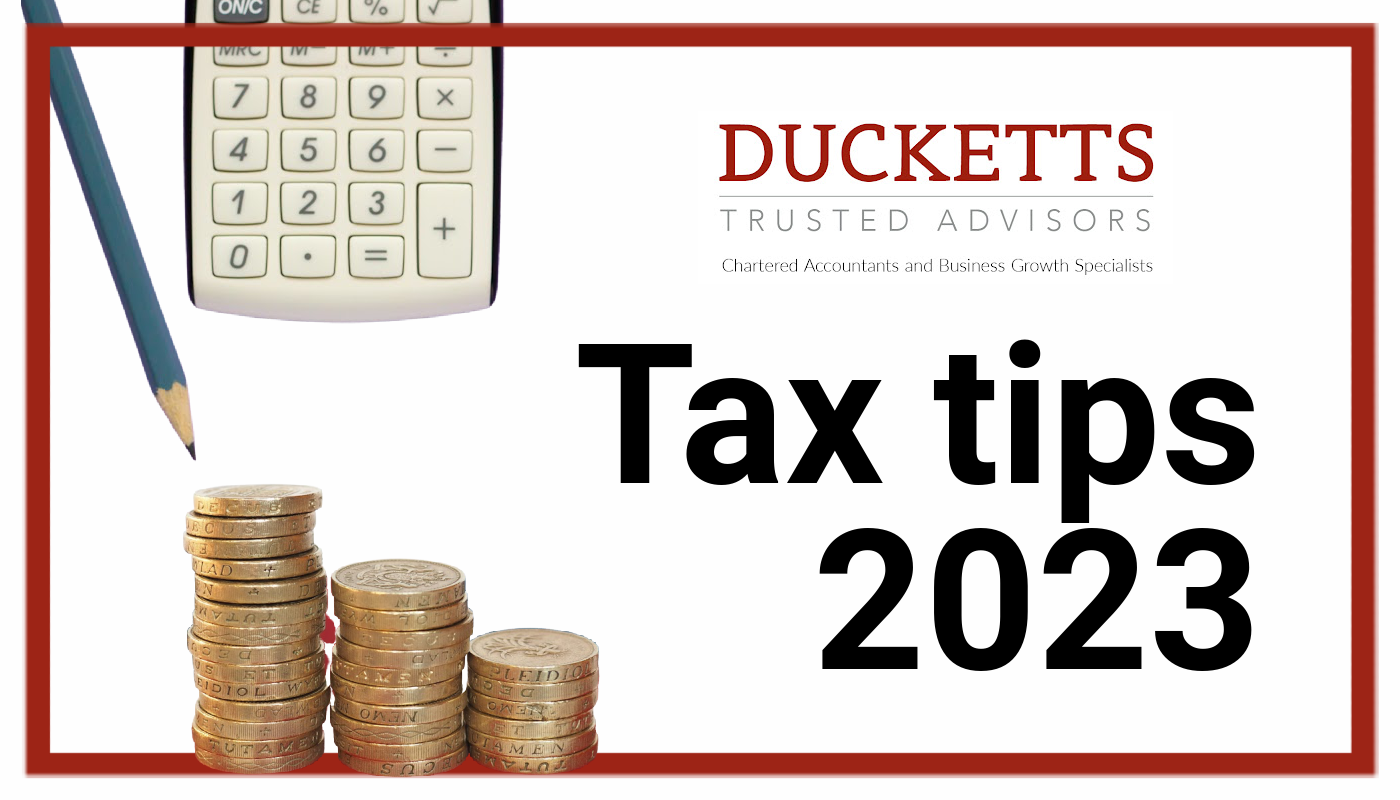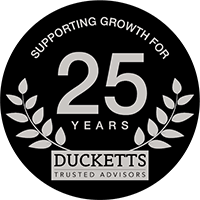Tax Tips 2023
Published:

A summary of the issues we think are relevant now and going forward.
Income Tax
Personal tax
The tax-free allowance has been frozen at £12,570 until 2026. Individuals with income over £100k lose this on a sliding scale of £1 for every £2 until they get to £125,140. So income between £100k and £125,140 actually gets taxed at 60%. This is to be avoided.
The point at which the 40% tax rate applies, is £50,270, ignoring the things that increase that level, such as pension contributions and charitable donations. From April 2023 the additional rate threshold at which the 45% tax rate applies has been lowered
to £125,140.
Dividends
Form April 2023 the nil rate band is £1k and from April 2024 the nil rate band is reducing further to £500. The rates over this are 8.75%, 33.75% and 39.35%.
Savings rate
Interest on savings up to £1k is tax free. HR taxpayers get the first £500 tax free and additional rate taxpayers don’t get any allowance unfortunately.
Transfer of allowances between couples
Married couples where one person has unused tax relief can transfer up to £1,257 to the other and save a maximum of £252. This only works where neither spouse is a higher rate taxpayer.
Child benefit
Repayable where one of the household has income over £50k. Some families have decided not to claim child benefit, but this could cause a problem for a non-working parent who does not pay national insurance because it creates a gap in contributions and impact the amount of state pension paid.
If child benefit is never claimed for a child, their National Insurance number will not be automatically issued at the age of 16, which will cause a problem further down the line.
Pensions
The pension Annual Allowance (AA) will increase from £40,000 to £60,000 from April 2023. The AA applies to the combined pension input by the individual and, in the case of employees, their employer. Pension contributions in excess of the AA result in a tax charge on the individual, although they may take advantage of unused AA amounts from the 3 previous tax years.
For those with high incomes, the AA is tapered. From April 2023, where a taxpayer’s adjusted income exceeds £260,000 (increasing from £240,000), the AA is tapered by £1 for every £2 in excess of £260,000, down to a minimum of £10,000 (increasing from £4,000).
IHT
Nil rate band and residence nil rate band stay at £325k and £175k respectively.
These allowances/rates will apply until April 2028.
Capital gains
CGT rates
No change from 10/ 20% and 18/28% for houses but the annual tax-free capital gains tax exemption (or allowance) will be reduced to just £6kin 2023/24 and only £3k in 2024/25.
CGT on residential property sales – report and pay deadline extended to 60 days If you sell a house and CGT is due, the gain must be reported and tax paid within 60 days of sale. HMRC will issue penalties for missing the 60 day deadline.
VAT
The VAT registration and deregistration thresholds continue to be frozen at £85,000 and £83,000 respectively. This will remain the case until March 2026.
Since 1 January 2023, a new penalty regime has been in operation for late VAT return submission and late payment of VAT. The new system is designed to target more persistent offenders, with penalties escalating quickly where defaults reoccur.
Business Taxes
National Insurance Contributions (NIC) for the self-employed in 2023/24
Self-employed individuals are required to pay Class 2 and Class 4 NICs if their profits exceed £12,570. These NICs are usually collected with the individual’s income tax self-assessment payments.
For 2023/24, Class 2 NICs are calculated at £3.45 per week and Class 4 NICs are calculated at 9% on profits between £12,570 and £50,750, and at 2% on profits over £50,750.
MTD for Income Tax
MTD for Income Tax comes into effect if you are self-employed or a landlord from April 2026 and if you have an annual business or property income of more than £50,000 and April 2027 if you have an annual business or property income of more than £30,000. The start date for MTD for partnerships and companies has not been confirmed.
Standardisation of tax and accounts
HMRC want all self employed businesses to be taxed on the profit they make in a tax year regardless of their accounting date. A business with accounts to 30 April face the prospect of reporting nearly 2 years’ worth of profits on their return for the first year.
There will be complicated rules for spreading the extra tax over a number of years.
The transitional tax year will be 2023/24 so the tax bill payable in January 2025 could be painful. This measure will make no difference to businesses who draw up accounts to 31st March or 5 th April.
Tax Relief for expenditure on plant and machinery
The Annual Investment Allowance (AIA), giving 100% tax relief to unincorporated businesses and companies investing in qualifying plant and machinery, is now permanently set at £1million.
The super-deduction, which gives enhanced 130% relief for new qualifying plant and machinery acquired by companies, ended on 31 March 2023.
As a replacement for the super-deduction, ‘full expensing’ (effectively 100% tax relief, called a ‘First Year Allowance’ (FYA)) will be available to companies incurring expenditure on new qualifying plant and machinery between 1 April 2023 and 31 March 2026. The qualifying criteria is quite broad although there are exclusions, including cars and features integral to a building (for example, heating systems). With regard to ‘integral features’, a smaller 50% FYA will be available. Subsequent disposals of assets on which one of these FYAs has been claimed will trigger a clawback of tax relief at a rate of 100% or 50% of the disposal proceeds, depending on the rate of the original relief. These new FYAs will mainly be of interest to companies that have already fully utilised their £1million AIA.
The separate 100% FYA for electric vehicle charge points remains available for unincorporated businesses and companies until Spring 2025.
Corporate Taxes
CT rates
From April 2023 we go back to different tax rates. 19% for small profits (up to £50k). Profits over £250k will be taxed at 25%. Profits falling between £50k and £250k will be taxed at the marginal rate.
R&D
From 1 April 2023 a raft of changes is coming to the R&D tax relief regime. The key
changes are:
- The Research and Development Expenditure Credit (RDEC) available to non-SME companies will be increased from 13% to 20%.
- For SME companies, R&D tax relief rates will be reduced from 230% to186%.
- For loss-making SME companies, the current payable credit of 14.5% will only be available for companies whose R&D expenditure constitutes at least 40% of their total expenditure. For R&D claimants that don’t meet the new 40% test, the payable credit will be reduced from 14.5% to 10% of the eligible loss.
- Qualifying R&D expenditure will be expanded to include data licences and cloud computing services.
- New claimants (those who have not made a claim in the previous 3 years) will be required to inform HMRC of their intention to make a R&D claim within 6 months of the end of the accounting period to which the claim relates.
From 1 August 2023, additional information requirements will need to be fulfilled when making a R&D claim.
Employment Taxes
National Living Wage
To increase to £10.42 per hour from 1.4.23. This applies to 23 year olds and above.
Don’t miss birthday related increases.
National Insurance
This has gone back down by 1.25%. So employees will pay at 12% and employers at 13.8%.
Car and van benefits
Employees are required to pay income tax on certain non-cash benefits. For example, the provision of a company car constitutes a taxable ‘benefit in kind’. Employers also pay Class 1A NIC at 13.8% on the value of benefits.
The set percentages used to calculate company car benefits are fixed until 5 April 2025 before slight increases apply to most car types, including electronic and ultra-low emission, from 6 April 2025.Vans/commercial vehicles are still taxed at much
lower rates than petrol/diesel cars. The taxable van benefit in 23/24 will be £3,960 and fuel £757.
PAYE
Employer allowance is £5k per annum for 23/24, but employers with only one employee cannot claim it also any business with a NI bill (Ers only) of £100k or more cannot claim it. Connected businesses (those under common control) can only claim once and the NI bills are amalgamated for the purposes of the £100k test.
Time to pay
HMRC are still prepared to enter into delayed payment terms for personal and business taxes. They will expect chapter and verse on the reasons and circumstances.
And finally, some well needed humour
I went to the doctors the other day and I said, "Have you got anything for wind?" So, he gave me a kite.
Latest Posts
The Budget 2025
Welcome to the Team, Adam Wright!
Volatile, Uncertain, Complex and Ambiguous.
Meet The Team - Phil Taylor
Tax Tips 2025

